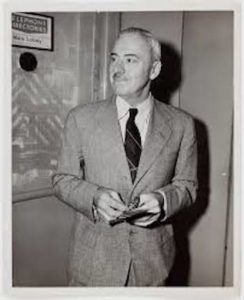
Thomas Parran Jr.
*Thomas Parran was born on this date in 1892. He was a white-American physician and Public Health Service officer.
Thomas Parran Jr. was born and raised near St. Leonard, Maryland, on his family's tobacco farm. A relative tutored him at home and attended St. John's College in Annapolis, Maryland, on a scholarship. Finances influenced his decision to attend Georgetown University School of Medicine and to follow with an internship at Sibley Memorial Hospital in Washington, D.C.
A lifelong research interest was sparked during medical school when Parran volunteered at a health laboratory operated by the District of Columbia under Dr. Joseph J. Kinyoun. He recruited Parran to join a field team of young physicians building privies and surveying conditions in the Southern States. In March 1917, Parran reported to Okmulgee, Oklahoma, for the first of many assignments in rural sanitation.
In October 1923, he joined a group of young medical officers who attended six months of coursework at the Hygienic Laboratory. He received the practical equivalent of a master's degree in public health. Parran was Chief of PHS's Division of Venereal Diseases (September 1926). Parran worked to sway public sentiment away from moral condemnation of venereal diseases and toward consideration of syphilis as a medical condition and threat to public health. His talents in rural health administration would soon lead him temporarily in a new direction.
A reform-minded governor, Franklin Roosevelt, requested that Parran be loaned to the State of New York, where in April 1930, Parran took up his post as state health commissioner. His primary task was chairing a Special Health Commission whose recommendations (1932) provided a framework to bolster county health departments in the face of needs in the Great Depression. Few of the commission's recommendations were enacted. Parran's work on syphilis achieved more success. The Columbia Broadcasting System inadvertently launched his campaign after radio executives censored the phrase "syphilis control" from a talk, leading Parran to cancel his appearance. Newspapers across the United States reprinted the censored speech.
In 1934, his former supervisor, Roosevelt, appointed Parran to the Committee on Economic Security. After Surgeon General Hugh S. Cumming's term, President Roosevelt appointed Parran as Surgeon General of the United States; he was sworn in on April 6, 1936. Parran's syphilis control campaign was in full swing by the fall of 1936. Title VI funds supported efforts to identify and treat syphilis, and the National Venereal Disease Control Act of 1938 made funds available for rapid treatment centers that employed the new sulfa drugs and penicillin.
1937, his book about syphilis, Shadow on the Land, was published and very well received. However, unpublished essays with little and misleading evidence have suggested that his work against syphilis is tainted by the Tuskegee Syphilis Study (1932-1972) and the Guatemala syphilis experiments (1946-1948), which were conducted by the PHS's Division of Venereal Diseases, partially during his tenure as Surgeon General. These studies were done without patient consent to medical risk.
The Tuskegee Syphilis Study occurred during his tenure as U.S. Surgeon General from 1936 to 1948 and involved experimentation on African American adults, children, and people with disabilities without their knowledge or consent. Information about the Study and life-sustaining treatment was withheld from 399 black men with syphilis so researchers could observe the progress of the disease. Throughout the 40-year study, 28 men died from syphilis, 40 spouses were infected, and 19 children were born with a congenital form of the disease. Thomas Parren Jr. died on February 16, 1968.
The American Sexually Transmitted Diseases Association named its Lifetime Achievement Award after Parran in recognition of his work to raise awareness of sexually transmitted diseases. However, his role in the Tuskegee study and Guatemala syphilis experiments in April 2013, the Association executive renamed the Award 'The ASTDA Distinguished Career Award.' In June 2018, the University of Pittsburgh announced that it would remove Dr. Parran's name from the campus building that houses the Graduate School of Public Health due to his involvement in the infamous Tuskegee Syphilis Study, which has a legacy of unethical experimentation.
An official committee at the University of Pittsburgh reported the following on Thomas Parran, M.D., who was a founder of the University's Graduate School of Public Health: “Dr. Parran’s role, and the extent of his influence in approving, funding, and providing oversight of the Tuskegee and Guatemalan studies, is not entirely clear. Based upon the evidence available today, it might not be possible to determine with certainty Dr. Parran’s level of knowledge and involvement in the studies.” Office of Diversity and Inclusion Review Committee on Parran Hall, University of Pittsburgh, Report and Recommendations (June 11, 2018).